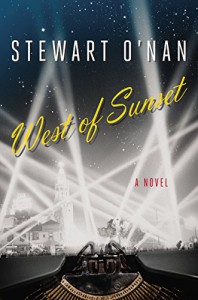Currently reading
Eleven
A Month in the Country
A Tale of the Dispossessed: A Novel
Mesabi Pioneers
The Crusades Through Arab Eyes
Island of a Thousand Mirrors
West of Sunset
 The trouble with reading historical fiction about writers is that I want something I can't have. I want some insight into the writer's thought process, his priorities, his work. But that's what you get from a memoir, not historical fiction. This telling of the last few years of Fitzgerald's life focuses, inevitably, on the facts that are externally verifiable. His alcoholism plays a central role, along with Scott, Zelda, their daughter Scottie, and Scott's Hollywood love, Sheila. Scott and Zelda are both crazy, although we're led to believe that Zelda is violently crazy much of the time, and Scott only when he's drunk.
The trouble with reading historical fiction about writers is that I want something I can't have. I want some insight into the writer's thought process, his priorities, his work. But that's what you get from a memoir, not historical fiction. This telling of the last few years of Fitzgerald's life focuses, inevitably, on the facts that are externally verifiable. His alcoholism plays a central role, along with Scott, Zelda, their daughter Scottie, and Scott's Hollywood love, Sheila. Scott and Zelda are both crazy, although we're led to believe that Zelda is violently crazy much of the time, and Scott only when he's drunk. The story captures the fickleness of Hollywood, moving Scott from project to project, as well as its glamour. There are lots of famous names and partying and star gazing. Some fun dialog. I feel the character of late 1930s Hollywood is captured well. I can understand why Fitzgerald wants to be there, beyond the potential for paychecks.
But the story fails to capture any positive characteristics of Fitzgerald himself. It's unclear why his friends befriend him or his lover loves him. He seems a terrible companion in every way. He's duplicitous and violent. Drunk so much of the time, morose the rest. He comes off so badly that his letters to Zelda and Scottie seem out of character in their tenderness. I understand why Sheila stays away when she does, but I don't understand why she comes back. I think that in some way the story has failed here; surely the writer had something to recommend him as a companion, a friend, even in these last few years of his life when he was battling his health.
I received a free copy of this ebook from the publisher.









